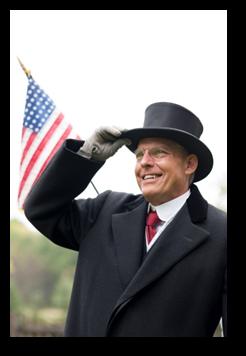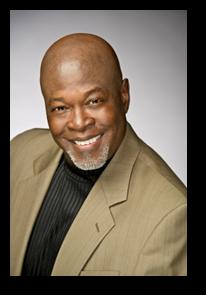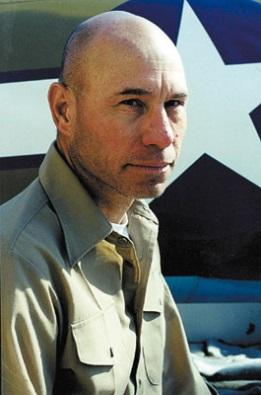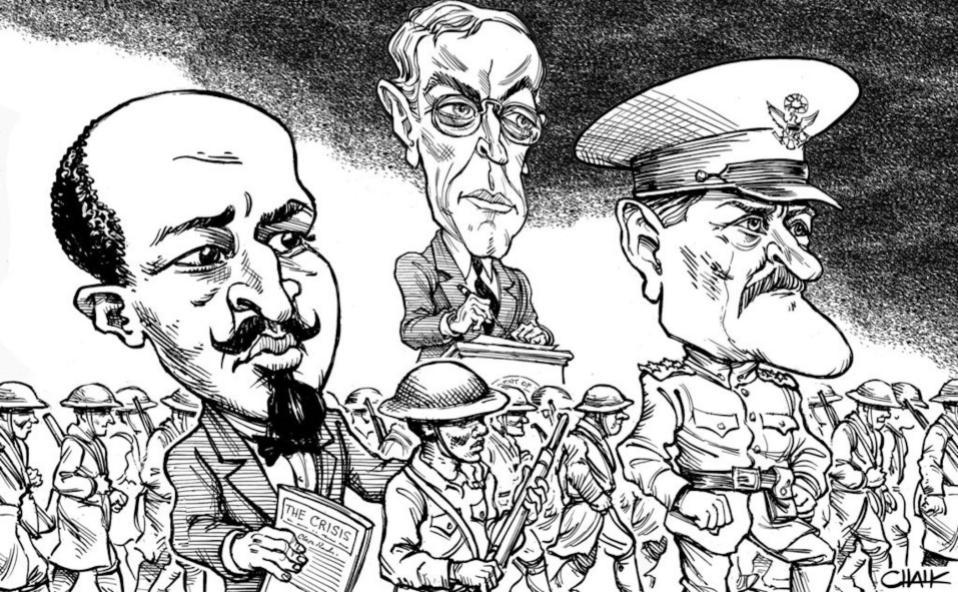Maryland Humanities, with local partners, will present Chautauqua, its annual living history series, in seven Maryland counties from July 5 through July 14.
For its 23rd season of Chautauqua, Maryland Humanities is commemorating the 100th anniversary of the United States’ entry into the Great War as three World War I-era figures come to life on the Chautauqua stage. Free and open to the public, each show begins with live local musical and theatrical acts. Question and answer sessions follow living history performances by actors/scholars, which spark spirited conversation and provide educational family fun. Audiences will meet one of the most important African-American activists of the early 20th Century, W.E.B. Du Bois; the commander of the American Expeditionary Force on the Western Front in World War I, General John Pershing; and the 28th President of the United States, Woodrow Wilson.
Chautauqua performances will take place at: Garrett College in McHenry; Montgomery College, Germantown Campus; the Community College of Baltimore County in Catonsville; the Cecil County Public Library in Elkton; Harford Community College in Bel Air; the Chesapeake Bay Maritime Museum in St. Michaels; Cecil College Elkton Station in Elkton; and the College of Southern Maryland in La Plata. The full schedule is available on our website at https://www.mdhumanities.org/programs/chautauqua.
Chautauqua is supported in part by Old Line Bank, Baltimore County Commission on the Arts & Sciences, and Talbot County Arts Council with funds from the Maryland State Arts Council. Host partners include Cecil College Elkton Station; Cecil County Public Library; Chesapeake Bay Maritime Museum (with support from Karen & Langley Shook); College of Southern Maryland; Community College of Baltimore County; Garrett College and Garrett Lakes Arts Festival; Harford Community College; and Montgomery College, Germantown Campus.
ABOUT MARYLAND HUMANITIES
Maryland Humanities is a statewide, educational nonprofit organization that creates and supports educational experiences in the humanities that inspire all Marylanders to embrace lifelong learning, exchange ideas openly, and enrich their communities. For more information, visit www.mdhumanities.org. Maryland Humanities is generously supported by the National Endowment for the Humanities, the State of Maryland, private foundations, corporations, small businesses, and individual donors.
FEATURED HISTORICAL FIGURES
William Edward Burghardt Du Bois (1868–1963) was a sociologist, author, historian, and prominent civil rights activist of the early 20th century. Born on February 23, 1868 in Great Barrington, Massachusetts, Du Bois grew up in an integrated community thanks to the presence of a small but influential free black population. Du Bois attended Fisk University, a historically black college in Nashville, Tennessee. After graduating in 1888, Du Bois attended and obtained two additional degrees from Harvard University – a bachelor’s in history and a Ph.D. in sociology, making him the first African American to obtain a doctorate degree from the University. In the early 20th Century, Du Bois emerged as an unofficial spokesperson for African Americans. In 1910, he co-founded the National Association for the Advancement of Colored People, where he took the position of Director of Publicity and Research and served as editor of the monthly magazine, The Crisis. Du Bois used this platform to speak out against various issues, including the failure to integrate civil and non-civil service positions, a campaign promise of President Woodrow Wilson. By mid-century, Du Bois became a dedicated Pan-Africanist and anti-war activist. On August 27, 1963 at the age of ninety-five, W.E.B. Du Bois died in Accra, Ghana. He was survived by his second wife, Shirley Graham, his daughter, Yolande Cullen, and his stepson, David Graham Du Bois.
John Joseph Pershing (1860–1948) was a United States Army officer who gained fame during World War I. Born on September 13, 1860 in Laclede, Missouri, Pershing entered into military life as a West Point cadet in 1882. At West Point he was singled out for leadership roles, including First Captain, the highest possible cadet rank, and after graduation in 1886, he was commissioned a Second Lieutenant in the United States Army at the age of 26. Over the next thirty years, Pershing led a storied military career. During the Spanish-American War, he commanded the all-African American 10th Cavalry and was later awarded the Silver Citation Star—later upgraded to the Silver Star—for his valor. After the defeat of Spain, Pershing was stationed in the Philippines from 1899 to 1903 and during his tour led American forces against the Philippine resistance. In 1916, Pershing was tasked to lead a raid against Mexican revolutionary Pancho Villa after Villa raided a town in New Mexico, leading to the deaths of eighteen Americans. After the United States declared war against Germany in 1917, President Wilson selected Pershing to serve as commander in chief of the American Expeditionary Force to assist the Allied powers in Europe during World War I. The combined efforts of American, British, and French forces led to the Germans accepting an armistice in 1919, ending the war. Pershing then served as U.S. Army Chief of Staff until his retirement in 1924. On July 15, 1948, at the age of 87, Pershing died in Washington, DC. He was survived by his son, Francis Pershing.
Thomas Woodrow Wilson (1856–1924) was an American academic and politician who served as the 28th President of the United States. Born in Staunton, Virginia, on December 28, 1856, Wilson was raised in Georgia. He graduated from Princeton University in 1879, studied law at the University of Virginia from 1879 to 1880, and did graduate work in history, economics, and political science at Johns Hopkins University, receiving his Ph.D. in 1886. While teaching at various colleges and universities, including Bryn Mawr College and Princeton University, Wilson emerged as a leading political scientist, historian, and author. In 1902, he was elected President of Princeton University, a position that he held until his resignation in 1910, when he successfully ran for Governor of New Jersey. His reputation as a reformer led to his nomination for President by the Democratic Party in 1912. During his first term from 1913 to 1917, Wilson oversaw the New Freedom program, which aimed to expand economic opportunity and encourage competition. This included the establishment of the Federal Reserve System, new antitrust legislation, the first child labor act, federal rural credits, and the eight-hour work day for railroad workers. As the leader of the only great neutral power, Wilson sought to mediate an end to the First World War, only to see his own country drawn into the conflict in April 1917. When the war ended in November 1918, Wilson helped negotiate a peace treaty that included a plan for the League of Nations, a precursor to the United Nations. In response to the Republican-controlled Senate’s refusal to ratify the treaty, Wilson embarked on a month long speaking tour across the country in an attempt to rally support for the treaty and the League. Exhausted by the strain of the tour, Wilson suffered a debilitating stroke that left him infirm. Wilson finished the rest of his term, relying on the assistance of his wife Edith. On February 3, 1924, at the age of sixty-seven, Woodrow Wilson died at his home in Washington, DC. He was survived by his second wife, Edith Bolling, and his daughters Margaret Wilson, Jessie Sayre, and Eleanor McAdoo.
ABOUT THE PERFORMER/SCHOLARS
 Judd Bankert had just moved to Staunton, Virginia in 2000 when the curator of the Woodrow Wilson Birthplace approached him and pointed out that he bore a striking resemblance to the 28th President. Ever since Bankert has portrayed President Wilson as part of the Woodrow Wilson Presidential Library and Birthplace’s living history program. He has performed in scores of special interpretive programs and spoken at both public and private receptions. As a Staunton resident, he has access to one of the best research facilities for Wilson scholarship in the country. This, combined with an interest in history and experience as an educator (he was a certified K-8 teacher), has enabled him to create unique programs drawing from Wilson’s writings and speeches.
Judd Bankert had just moved to Staunton, Virginia in 2000 when the curator of the Woodrow Wilson Birthplace approached him and pointed out that he bore a striking resemblance to the 28th President. Ever since Bankert has portrayed President Wilson as part of the Woodrow Wilson Presidential Library and Birthplace’s living history program. He has performed in scores of special interpretive programs and spoken at both public and private receptions. As a Staunton resident, he has access to one of the best research facilities for Wilson scholarship in the country. This, combined with an interest in history and experience as an educator (he was a certified K-8 teacher), has enabled him to create unique programs drawing from Wilson’s writings and speeches.
 Bill Grimmette is a living history interpreter, storyteller, actor, and motivational speaker who has worked in film, television, and on stage throughout the United States and abroad. He has appeared as Martin Luther King, Jr., W.E.B. Du Bois, Frederick Douglass, and Benjamin Banneker at Chautauquas in Maryland, Colorado, and South Carolina and at schools in the Northern Mariana Islands. He has also performed at the Smithsonian Institution, the Kennedy Center, and on National Public Radio. Grimmette has an M.A. in psychology from the Catholic University of America and has done post-graduate work in education at George Mason University.
Bill Grimmette is a living history interpreter, storyteller, actor, and motivational speaker who has worked in film, television, and on stage throughout the United States and abroad. He has appeared as Martin Luther King, Jr., W.E.B. Du Bois, Frederick Douglass, and Benjamin Banneker at Chautauquas in Maryland, Colorado, and South Carolina and at schools in the Northern Mariana Islands. He has also performed at the Smithsonian Institution, the Kennedy Center, and on National Public Radio. Grimmette has an M.A. in psychology from the Catholic University of America and has done post-graduate work in education at George Mason University.
 Doug Mishler is an independent scholar who has taught at the University of Nevada and Western Washington University. He is the author of a history of the Ringling Brothers Circus and has consulted on several public television and Chautauqua programs. Since 1995, Mishler has appeared in Maryland Humanities’ Chautauquas as P. T. Barnum, Theodore Roosevelt, William Lloyd Garrison, Henry Ford, Jefferson Davis, George Wallace, Upton Sinclair, and Major General Robert Ross. He also portrays Ernie Pyle, Billy Sunday, William Clark, Andrew Carnegie, Edward R. Murrow, Thomas Hart Benton, and Nikita Khrushchev. Mishler has a Ph.D. in American cultural history from the University of Nevada, Reno.
Doug Mishler is an independent scholar who has taught at the University of Nevada and Western Washington University. He is the author of a history of the Ringling Brothers Circus and has consulted on several public television and Chautauqua programs. Since 1995, Mishler has appeared in Maryland Humanities’ Chautauquas as P. T. Barnum, Theodore Roosevelt, William Lloyd Garrison, Henry Ford, Jefferson Davis, George Wallace, Upton Sinclair, and Major General Robert Ross. He also portrays Ernie Pyle, Billy Sunday, William Clark, Andrew Carnegie, Edward R. Murrow, Thomas Hart Benton, and Nikita Khrushchev. Mishler has a Ph.D. in American cultural history from the University of Nevada, Reno.



Write a Letter to the Editor on this Article
We encourage readers to offer their point of view on this article by submitting the following form. Editing is sometimes necessary and is done at the discretion of the editorial staff.